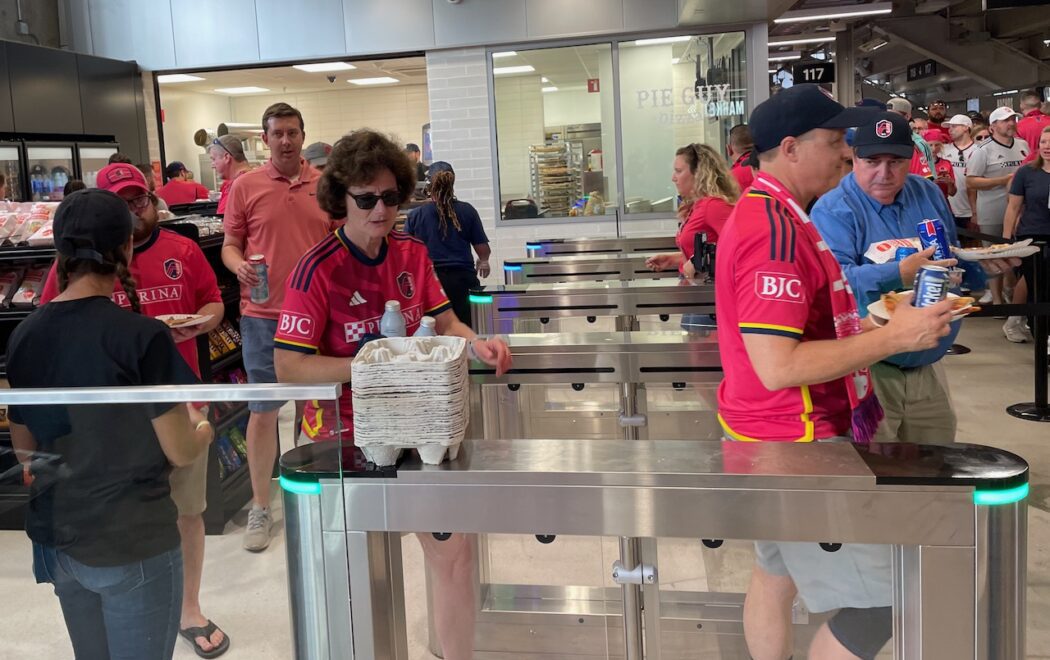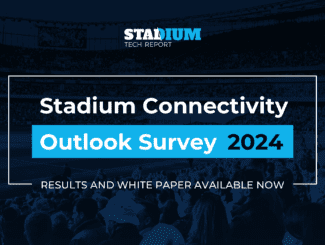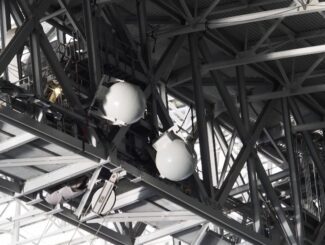
Contrary to what you might have read elsewhere on the internet this week, checkout-free shopping technology is alive and well and growing — at least in the stadium concession-stand segment of the marketplace.
Since we did our big checkout-free market count back in October, the number of stadium-specific stores has grown from 141 stores to 180 stores, a net gain of 39 new stores announced in the past half-year. And my guess is we will have some more stores at baseball and soccer stadiums trickling in over the next month or so, before a big push ahead of the football and hockey/basketball seasons in the fall. So as far as we can tell, more stadiums are jumping on the checkout-free bandwagon, while stadiums that had already deployed stores are adding more. If you read the results of our Stadium Connectivity Outlook survey this past fall, you would not be surprised.
If there was a blip on the checkout-free radar it came courtesy of a story by The Information that broke the news about Amazon pulling Just Walk Out technology (Amazon’s implementation of checkout-free) from many of its Amazon Fresh grocery stores. Inside that story was a link to a 2022 story by The Information which had talked about Amazon’s use of live people in India to both check transactions as well as “annotate” transactions to help improve the overall AI model.
Since The Information has a costly firewall, most people probably didn’t read the actual stories but instead were left with the second-hand permutations. In classic Internet telephone-game style, as sites other than the originator fed upon each other, the story somehow baked into multiple versions of “autonomous shopping is dead” to “it’s all a fake” and a lot of anti-Amazon screeds for frosting. We even saw posts from well-known mainstream news outlets that proclaimed that Amazon only had its Just Walk Out technology in “a few” stadiums. (Stadium Tech Report narrator: Amazon now has 73 stadium Just Walk Out stores.)
This LinkedIn post by The Information’s actual reporter describes some of the fallout, with a good overall take that what reporting like this really was doing was pointing out that companies who tout AI-powered technology should be more transparent about the need for real humans to help make it all work.
We’ve taken that stance as well in the past.
When it comes to checkout-free technology, we had always figured there was some human element behind all the cameras and sensor technology that was adding up all the transactions. The fact that for most of the providers it took some time to produce receipts seemed to be a sign that all the computing may not have been exactly real-time. But to think the whole thing is a made-up sham also pushes the barriers of common sense. Especially when stadiums, teams and concessionaires all tell stories of increased revenues at stands where fewer staffers are needed. I guess if it’s all just cloud-based cashiers on cameras that system is actually working pretty well, so who cares if it’s AI or not?
To clarify matters, we asked the top three providers of stadium checkout-free stores whether or not they used humans as part of their operational chain. Here are their replies:
Zippin (82 stadium stores). In an email exchange, CEO Krishna Motukuri said: “At Zippin, we do have a 24×7 support and monitoring team that is generally inline with a typical software system running partly in the cloud and partly on prem, in an operationally dynamic environment like a stadium, a theme park or an airport. We also use humans to annotate and enrich datasets that are used for training our AI models.”
When I asked “Are there ever times when humans need to settle or correct a transaction that the autonomous system for whatever reason couldn’t resolve?” Motukuri responded: “Yes, for a small percentage of transactions where the overall system confidence is low, either because one of the hardware components is temporarily down, or there is an operational error by the store crew, or the AI needs assistance, humans may review the transaction and make corrections.”
Amazon (73 stadium stores plus four RFID retail stores): This is the company’s response to the claims from the original story by The Information: “The characterization that Just Walk Out technology relies on human reviewers is inaccurate. The primary role of our Machine Learning data associates is to annotate video images, which is necessary for continuously improving the underlying machine learning model powering Just Walk Out technology. Associates may also validate a small minority of shopping visits where our computer vision technology cannot determine with complete confidence an individual’s purchases. Just Walk Out technology has continued to scale while reducing the number of human reviews year-over-year.”
AiFi (22 stadium stores): An email reply from CEO Steve Carlin said the following: “For computer vision AI to work with high accuracy, the kind that is required to generate a receipt, a ‘human in the loop’ is required. That will always be true for what AiFi does, which is more about understanding behavior in a store than anything else. However, the issues isn’t if there are people annotating data, it’s how efficiently and effectively can that be done. AiFi only employs, at any moment, 44 active annotators (220 total with shifts adjusted for occupation) and sends only 0.3% of the total video produced for review. Why? Because AiFi deeply understands what is needed to ensure accuracy in retail spaces and its tech has been specifically designed to do so.”
Far from believing the technology is “magic,” we’re pretty aware that it’s actually really hard to make these things work as promised. Witness the abandonment of the checkout-free market by startup Standard AI, which couldn’t make things work even with $260 million in venture funding. We may have to knock a few checkout-free stores off our list, since our guess is that the three stadium stores previously run with Standard AI technology (two at American Airlines Center in Dallas and one at a minor-league baseball stadium) may no longer be in operation. Standard AI will no longer comment on its stadium stores, and team executives at American Airlines Center in Dallas have not yet responded to our question as to whether the stores are still operating.
Our guess, however, is that deletion will soon be replaced by more checkout-free concession stands, maybe at that stadium and certainly at many others. While the technology may not be the best fit for bigger grocery stores, it certainly seems tailor-made for stadiums, especially since the smaller spaces and more limited number of items makes it easier for the technology to work as advertised — with or without human help as needed.








